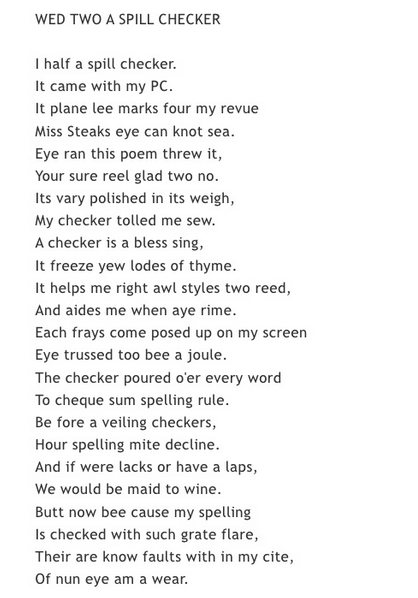The above sentence is one that I came across while reading a self-published novel the other day, and is a perfect example why one cannot merely rely on a spell-checking program to ensure that one’s writing is error-free. Although “sew” and “sow” are homophones (they sound the same despite having different spellings and meanings), they are obviously not interchangeable: we sow seeds, and sew clothes. SpellCheck, or any inbuilt spell-checking program, wouldn’t catch that, and anyone proofreading or editing your work would be patently unimpressed to come across it. Although a spell checker is a handy tool for general use, it will never fully take the place of educating yourself properly and polishing your writing skills. Here are 8 solid reasons why you shouldn’t just rely on a program to help you out in daily communications and professional writing:
1. It Won’t Catch Homophonic Errors
As in the example at the top of this page, there are many words that sound the same as others, and if you use them in lieu of the correct words (and spell them correctly), SpellCheck won’t catch them. According to the program, ewe kin rite awl kinds a things and they’ll still go threw. Case in point: SpellCheck didn’t highlight anything in that sentence as incorrect. When I have been responsible for sifting through cover letters and resumes for potential job candidates, I discarded any that had blatant spelling errors. If someone can’t discern between “weather” and “whether,” or “could of” and “could have,” I’d worry about their competence in any professional role.
2. SpellCheck Won’t Catch Typos That Are Actual Words
When you write phrases such as, “In miss you,” “I’ll pick the care up from the garage,” or, “We’re having meet for dinner,” SpellCheck doesn’t catch any errors, because none of the words are actually misspelled. The same thing goes for Word and other word-processing software: phrases and words that are spelled properly aren’t picked out as wrong, so you can write something utterly nonsensical merely by adding or subtracting a letter or so, and it’ll still go through as perfectly okay. Ask me how much trouble I once got into by accidentally referring to a Rabbi as a “rabbit” in a work email. Additionally, misplaced gaps in sentences will be allowed through: have you ever sent an IM or text only to realize that you’ve hit the space bar too soon (or too late)? Instead of writing, “She meant Rick,” if referring to a friend’s comment about another, you may end up writing, “She mean trick.” That’s quite a different expression, if rather inarticulate.
3. You Won’t Learn From Your Mistakes
As mentioned above, words that are spelled correctly won’t be picked out, and you’ll end up making the same errors over and over again. You might use “adverse” instead of “averse” when implying that someone isn’t fond of an idea, or say that a person was “effected” by a policy, rather than “affected.” If the people you work with don’t know the difference between these words either (or are too hesitant or polite to point out that you spelled something wrong), you’ll continue to use them improperly. This could backfire really badly if and when you apply for a position with people who require higher standards of writing proficiency than you’ve been accustomed to.
4. Hideous Sentences Will Be Allowed Through
Redundancies, misplaced modifiers, errant quotation marks, and multiple hyphens in lieu of proper dashes won’t be pointed out as wrong, so that article you might be submitting to an editor will leave them gawking in horror at the fact that you’re allowed anywhere near a computer at all. An example: “The young was girl was walking the dog in in a short skirt.” Guess what SpellCheck didn’t pick out as wrong?
5. It Makes You Lazy
If you’re not constantly aware of the words you’re typing in order to ensure that they’re spelled correctly, you can get sloppy. Sure, anything you type formally should still be amended by the program, but what if you actually have to use a pen and paper to leave a note for someone?
6. You Won’t Always Have Access To It
If you rely heavily on a spell checker to catch your errors, you won’t ameliorate your own writing skills and may end up making rather egregious errors when using a program that doesn’t have one installed. Certain IM programs don’t check your spelling as you type, and many phones don’t have spell-checking software checking your texts before you hit “send.” If you have to send a text to a client or your boss, or you’re in a Skype chat with someone whose opinion of you actually matters, and your spelling skills are on par with your eight-year-old nephew’s, you’re in for it.
7. It Can Be Wrong
SpellCheck isn’t necessarily up to date on neologisms, slang terms, or marketing jargon, and can mark certain expressions or words as incorrect when they’re actually just fine as they are.
8. It Won’t Discern What You Meant To Write From What You Actually Wrote
Most of us think more quickly than we type, which leads to words being omitted or sentences being mangled. SpellCheck won’t clue in to the fact that you left out several vital words in a paragraph: if they’re not misspelled, it doesn’t care. It’s actually best to take a break from a piece after you’ve written it and then go back to it with fresh eyes, as you’ll put enough distance between yourself and your work to be able to find mistakes and omissions. We’ll often choose the wrong word in conversation or writing because it sounds similar to the one we meant, but if you sign off an email “with love and infection,” the recipient might be a bit unnerved. You don’t want that. Whether you’re writing an essay, an article, a blog post, or your PhD thesis, it’s important to go through your work thoroughly to ensure that it’s error-free: relying on a program that will only catch typos is sure to land you in trouble. If you do proofread your work, determine that there’s nothing wrong with it, and then find out that there were several errors within it, you might want to read books a bit more often in order to re-familiarize yourself with formal written English.

